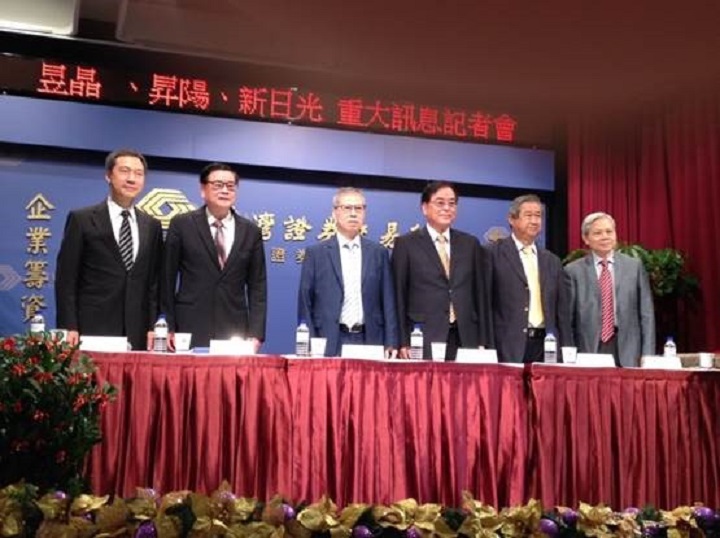As reported by pv magazine last Friday, leading Taiwanese solar cell companies Gintech, Neo Solar Power (NSP) and Solartech are to merge into a new, single company.
United Renewable Energy Co., Ltd (UREC) is the name given to the new company, which is to be officially created by the end of December, with the merger process complete by Q3 2018. A Letter of Intent – while not legally binding – has been signed by the three boards of directors and lays out the terms of the merger.
Interestingly, the creation of UREC will be based on all three firms having an equal and mutually beneficial say in the running of the new company. For legal reasons, however, NSP will remain as the surviving company after the merger with its two partners. Once the merger is complete, NSP will become UREC.
According to NSP’s Dr. Hong, the intention is for UREC to have five separate business units, each overseen by various factions within UREC: wafers by Gintech, cell and other new business by Solartech, and modules and projects by NSP.
In a press release issued by NSP, the company said that “faced with a highly competitive and increasingly concentrated market, the companies believe that Taiwanese manufacturers should come together to form a solar flagship company with a competitive edge on the global market, and build a flourishing and prosperous integrated platform”.
According to NSP, UREC will seek to create a new business model for Taiwan’s green energy industry, and will invite other Taiwanese solar companies to join its platform, “so as to facilitate the sustainable development and upgrade of Taiwan’s solar power industry”.
Some of the stated aims of the new entity are to become vertically integrated, build self-owned modules and step into the power plant development business. “The establishment of UREC will allow Taiwan’s solar cell industry to get rid of its role as foundries and further urge the green energy industry to root and grow strongly in Taiwan,” said the press release.
Popular content
There had been concern within the country that Taiwan’s solar cell firms were too reliant on and exposed to the whims of China’s solar appetite. In the past few months NSP, Gintech and Solartech had all made steps to modernize, branch out or streamline their business operations in response to tougher market conditions.
To some analysts, this merger has not come as a complete surprise. “The Taiwanese solar cell firms have always collaborated closely, so an official merger is an unsurprising next step,” Bloomberg New Energy Finance (BNEF) solar analyst Jenny Chase told pv magazine.
Edurne Zoco, senior manager and principal analyst for solar research at IHS Markit, also told pv magazine that the merger has likely been undertaken with Taiwan’s domestic market in mind.
“The cell merchant market is small and Taiwan is where most producers are located,” Zoco said. “They don’t have a power position against the big wafer manufacturers in China, nor against module producers in China or elsewhere. So when prices start declining the cell node is usually the first one to feel the price pressure from module makers. At the same time they have limited power to negotiate lower prices with wafer manufacturers.”
Zoco added that cost structures are also higher for Taiwan’s cell producers, noting the fact that all three firms struggled in the first half of 2017 despite a globally positive market environment. “This is an indication of serious difficulties. Combining forces might help to get better procurement conditions.”
IHS Markit forecasts that Taiwan will soon surpass 1 GW of annual installations and thus a focused UREC that will prioritize the domestic market could help to strengthen this growth. “However,” Zoco added, “NSP and Gintech are among the top 10 cell manufacturers globally and their combined capacity clearly exceeds the needs of the local market, so they will still need to either continue selling cells outside Taiwan or build up additional module capacity to export modules to other markets.”
This content is protected by copyright and may not be reused. If you want to cooperate with us and would like to reuse some of our content, please contact: editors@pv-magazine.com.


1 comment
By submitting this form you agree to pv magazine using your data for the purposes of publishing your comment.
Your personal data will only be disclosed or otherwise transmitted to third parties for the purposes of spam filtering or if this is necessary for technical maintenance of the website. Any other transfer to third parties will not take place unless this is justified on the basis of applicable data protection regulations or if pv magazine is legally obliged to do so.
You may revoke this consent at any time with effect for the future, in which case your personal data will be deleted immediately. Otherwise, your data will be deleted if pv magazine has processed your request or the purpose of data storage is fulfilled.
Further information on data privacy can be found in our Data Protection Policy.